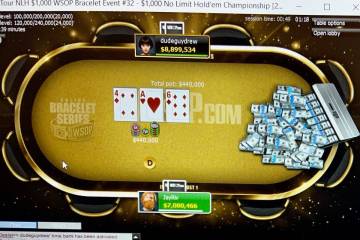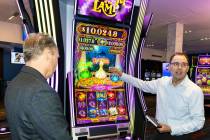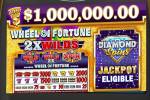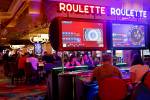Recent gaming mergers a relief to investors
The combined $11.5 billion in lottery company-slot machine company mergers in the past few weeks has the investment community relieved.
The gaming equipment sector, in the eyes of some analysts, has been bloated.
A soft replacement market for new games left slot machine manufacturers with a backlog.
In the past few years, many new products never made it from the Global Gaming Expo trade show floor to a casino.
A shake-up was needed.
In July, Italian lottery company GTECH Holdings announced it would buy slot machine giant International Game Technology for $6.4 billion. Less than two weeks later, New York-based lottery provider Scientific Games Corp. said it was acquiring Bally Technologies for $5.1 billion.
The deals for the Nevada-based companies — the world’s No. 1 and No. 2 slot machine providers — involve cash and stock transactions, along with debt assumption.
Fitch Ratings Service gaming analyst Alex Bumazhny said the buyouts were overdue.
“Duplicative costs, including research and development, have helped prime the industry for consolidation,” Bumazhny said. “We believe merger and acquisition activity in the sector underscores demand for slot suppliers’ content in a slow-growth environment.”
Gaming regulators from 300 jurisdictions worldwide need to sign off on the two deals, as will federal antitrust officials. The approval process for both deals will take up to 12 months.
Investors like the union between the lottery providers and slot machine manufacturers.
“In addition to cost synergies, we believe a marriage of slots and lottery business will enable Scientific Games and GTECH to leverage Bally’s and IGT’s slot content, respectively, across their lottery business,” Bumazhny said. “This is especially important because of the proliferation of online gaming, which lottery operators have an opportunity to participate.”
Both IGT and Bally have been making inroads in social gaming — more so IGT through the company’s DoubleDown Casino product. The businesses give the lottery companies another marketable product.
“The Scientific Games merger further consolidates the already oligopolistic slot supplier industry to create an almost equal sized competitor to IGT,” Bumazhny said.
Buckingham Research gaming analyst Brian McGill said the Bally deal makes Scientific Games more diverse. The lottery firm already had its foot in the slot machine business after buying WMS Industries for $1.5 billion in 2013.
Adding Bally brings in newer slot machine products — NASCAR, the music of Michael Jackson and the magic of David Copperfield. It also gives Scientific Games ownership of Bally’s healthy gaming systems business and unique table games Bally acquired when it bought SHFL entertainment for $1.3 billion last year.
Scientific Games also picks up SHFL’s line of automatic card shufflers and electronic table games.
McGill’s only concern is leverage. Scientific Games is assuming Bally’s $1.8 billion in debt, which will give the company about $8 billion in obligations.
“The debt load is increasing substantially, which represents roughly six times cash flow including synergies and adjustments,” McGill said. “While the company does not have any large near term maturities, we still think the leverage is significant.”
Moody’s Investors Service gaming analyst Peter Trombetta was also concerned about Scientific Games’ added debt. Scientific Games anticipates some $220 million in annual cost savings from the Bally buyout. But Trombetta said integrating WMS and Bally into one company could weigh down ability to make debt repayments.
“Apart from the increased leverage and integration hurdles, the current proposal makes strategic sense,” Trombetta said.
He added the “complementary nature of the two companies’ products” helps achieve an “enhanced scale” as well as “business and geographic diversity.”
In recent years, smaller and international slot machine manufacturers — including Multimedia Games, Australia’s Aristocrat Technologies and Ainsworth Gaming and Japan-based Konami Gaming — have cut into the larger companies’ market share.
Two weeks before the IGT and Bally buyouts, Aristocrat had analysts talking when it spent $1.3 billion to buy Video Gaming Technologies, a Tennessee-based slot machine maker that provides equipment to the American Indian casino market. The deal will triple the number of games Aristocrat has in the U.S. when it closes by the end of the year.
The mergers gives the two largest players in the slot machine space a new beginning, but McGill said the smaller and international companies aren’t going to lay low.
“The industry is very competitive and the (Scientific Games-Bally) transaction does not change the landscape dramatically,” McGill said. “We expect the industry to remain challenged for the foreseeable future.”
Howard Stutz’s Inside Gaming column appears Wednesdays and Sundays. He can be reached at hstutz@reviewjournal.com or 702-477-3871. Follow on Twitter: @howardstutz.




























